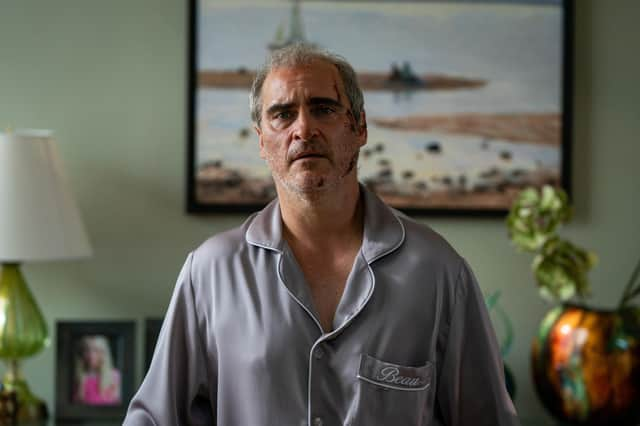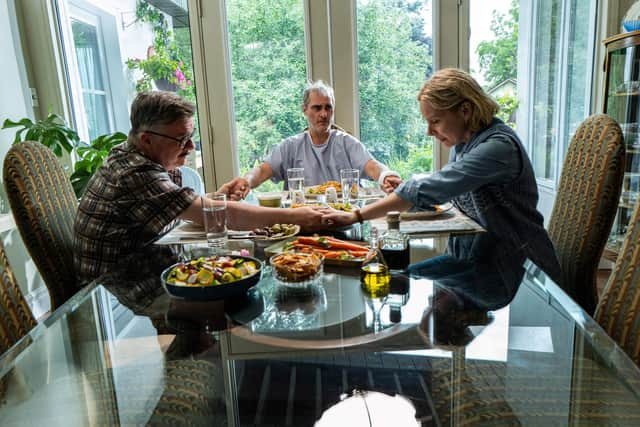Film reviews: Beau is Afraid | Are You There God? It’s Me, Margaret


Beau is Afraid (15) ****
Are You There God? It’s Me, Margaret (PG) *****
There’s a great moment in Beau is Afraid that captures horror auteur Ari Aster’s ongoing obsession with fate. The scene in question features Joaquin Phoenix’s Beau watching himself on TV while a security camera in the same room records the image he’s watching. The purpose of this hall-of-mirrors effect is at once obvious and mesmerising; we’re on a journey with a solipsistic figure who sees danger in every corner of his life, so what simpler way to expose his neuroses than have Beau see himself as others see him? Except Aster, who broke through with Hereditary and Midsomar, doesn’t end the scene there. Instead Beau presses pause on the TV’s remote control and, seeing his image freeze, gets curious and presses fast-forward. Suddenly he’s watching his immediate future unspool before his eyes in staccato jump-cuts of mounting terror. In a film overburdened with crazy visuals and laughably frank Freudian imagery, it’s a reminder of Aster’s brilliant ability to craft genuinely unnerving moments that show how trauma can condemn people to a path in life they’re powerless to change.
In Beau is Afraid, which isn’t so much a horror film as a three-hour, blackly comic Oedipal nightmare, that trauma is the titular Beau’s birth. The heightened anxiety of his arrival – which Aster presents as a disconcerting soundscape of muffled screams – tells us almost everything we need to know about Beau, whom we next seen sitting in his therapist’s office as a paunchy middle-aged man discussing his domineering mother on the eve of a long overdue visit. The dread of the impending trip is soon amplified by the Job-like trials he’s forced to endure as he prepares to leave his apartment the next day. For Beau, who lives in a fortress-like tenement block in an apocalyptic urban wasteland full of marauding addicts, naked serial killers and irrationally angry neighbours, just getting out the door is a Sisyphean task.
Advertisement
Hide AdBut the external chaos and insanity is nothing compared to the guilt trip his mother, Mona (played by musical theatre star Patti LuPone), subsequently lays on him for missing his flight. Her passive-aggressive disappointment cuts deeper than any knife, so much so that his fear of never seeing her again propels him on a purgatorial odyssey through an increasingly surreal landscape in search of some kind of reckoning.
Fans of Aster’s outré debut Hereditary will spot a lot of recurring themes and motifs here (decapitation features prominently). But where Hereditary buried the filmmaker’s psychological baggage under the cover of a Rosemary’s Baby-style satanic panic freak-out, Beau is Afraid drops the genre elements to present a more demented and psychologically naked portrait of someone working through some monstrous mummy issues. Phoenix, too, subverts his own recent spate of damaged man-boy roles, stripping away the pent-up rage that coursed through Joker and You Were Never Really Here to play the grown-up Beau like a scared kid permanently on the verge of peeing his pants.
It’s pretty wild stuff, each individual sequence a testament to Aster’s determination to defy cliché by finding new ways to actively reflect the chaos the modern world. Whether it adds up to more than the sum of its parts is another matter. It’d be easy to write off as an extreme cinematic act of oversharing on Aster’s part. But at a time when such personal, creative swings are in danger of being algorithm-ed out of existence, even that feels like something worth celebrating.


One wonders how Ari Aster’s career might have turned out if Judy Blume’s Are You There God? It’s Me, Margaret had been the seminal text of his adolescence instead of Brian De Palma’s adaptation of Carrie. If Kelly Fremon Craig’s utterly delightful film version is anything to go by, it might well have saved him some hefty therapy bills. Something of a bible for generations of pubescent girls (and probably a few progressively-minded boys too), Blume’s book, first published in 1970, is a coming-of-age story that functions as a map through the minefield of adolescence – menstruation, hormones, bodily changes, peer pressure – without feeling didactic. That’s one of the great qualities this film version retains. Instead of transposing it to a contemporary setting and turning 11-year-old Margaret Simon’s agnostic prayers into TikTok posts, Fremon Craig smartly sets the film in 1970 and approaches the period setting with an enlightened contemporary eye on gender roles and expectations, taking care to make all the characters fully rounded and seeing how they push against the conventions of the day.
The film sticks to the book’s basic plot by uprooting Margaret (wonderfully played by Abby Ryder Fortson) from her quasi boho life in chaotic New York and plonking her down in the suburbs of New Jersey after her Jewish dad (played by filmmaker Bennie Safdie) gets a promotion and her Christian mother (Rachel McAdams) opts to give up her job teaching art to focus on being a full-time mum. With a light touch, Fremon Craig – who made the similarly charming Edge of Seventeen – explores how this changing dynamic impacts Margaret at the very moment she’s rushing headlong into adolescence. The resulting film brilliantly balances the wonder and fear of puberty with Margaret’s desperate quest to figure out the wider family schisms caused by her parents’ conflicting religious backgrounds. McAdams does sterling work in the latter plotline, while Kathy Bates is a powder keg of fun as Margaret’s beloved Jewish grandmother.
Both films on general release from 19 May